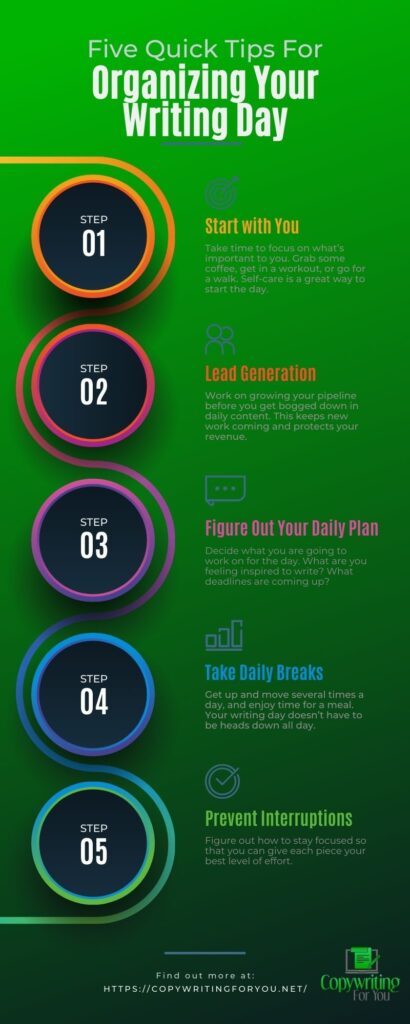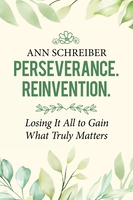
I often get asked about how I organize my work day to be the most productive. And it’s a fair question. As I am self-employed, I have the flexibility to work when I want, where I want, and for how long I want. But, I have found that setting some boundaries and instilling discipline into my day makes me the most productive.
So, if you are a new copywriter or freelance blogger trying to figure out how to approach your work day, or you are a client or prospective Copywriting For You client trying to learn more about my process. In that case, I have outlined the five tips that I use to organize my day. Of course, take these tips as guidance on what works for me. If even one of these tips works for you, it will be time well spent in helping you to be a productive copywriter.
Organizing Your Writing Day: How to Get Started
Before I share my five tips for organizing your writing day, let’s discuss some of the tools I use to make each day easier. For me, this means using an old-school composition notebook. As a freelance blogger for businesses, I receive new work all the time. I also write four to seven blogs a day for my clients.
So, I need to be super organized, especially since some of that work is coming in to me through Upwork and other work is coming to me through various email addresses I manage. And that’s where the notebook comes into play. Every time I check my email and receive a new assignment, or every time a new assignment comes in through Upwork (for those paying attention, I have an account on Fiverr too, but I am much more active on Upwork), I write down the project as a line item in my notebook.
Doing this makes sure I don’t lose sight of any projects. It doesn’t necessarily mean I will work on them in the order I write them down, but it makes sure that they get into my queue. This process may work for you, or you may benefit from other systems. I know writers who use project management tools such as Trello or Monday. And these work, too, especially if you are writing longer-form content.
With that, let’s get into my tips on how to organize your writing day.
1. Start with You
I know, you were expecting me to get right into the work day. But this is where one of the benefits of being self-employed really comes into play and can work its magic. So, take some time for some self-care before the day even gets going. This makes sure you make you a priority and don’t forget that time for you once you get bogged down in the work.
For me, this means sleeping until my body is ready to get up. Yep, I’m a late sleeper. I often don’t get out of bed until 8:45 a.m. or later—sometimes, it’s 9:30 or later. I listen to my body and make sure I get the rest I need. Then, four or five times a week, I don my workout clothes and head down to the basement to get in a workout. I’m a Peloton enthusiast (@AnnMBiking for those of you who want to connect), so I love to get in a 30-minute ride in the mornings.
Then, it’s time for some coffee, a shower, and time to head into my home office. My approach helps me feel like I’ve focused on myself and taken some time to do something good for my body before I start the day. It means I’ve checked something off my list before I even flip open that laptop.
2. Lead Generation
I talked about lead generation in a recent article in my series about the top mistakes I made my first year as a copywriter. And I’ll reiterate it again—lead generation must be a daily priority. While the pipeline might look good today, things can change without much notice in business blogging and copywriting.
So, take time to protect your income. I recommend focusing on lead generation at the beginning and end of your writing day. This might mean following up with clients you haven’t heard from in a while, bidding on new projects in Upwork, sharing your own blog on LinkedIn, Instagram, and other social media platforms, or attending a local networking event.
3. Figure Out Your Daily Plan
Once I’ve gone through my emails, updated my notebook with new assignments, and completed my lead gen tasks, it’s time to figure out what I am going to work on for the day. And the key here is to understand that one of my value propositions is to offer a seven-day turnaround time for work—obviously, sizeable projects might require more time. And I don’t promise to turn content around early (though I do say it may happen).
This gives me flexibility and prevents being pigeonholed into writing content that I might not be inspired to write that day. So, I go through my notebook to look at what assignments are outstanding and when they are due, and I create a plan of attack for the day. My plan prioritizes two things:
- What am I inspired to write?
- What content will help me reach my revenue target for the day?
I know that first bullet likely made sense, but you may be wondering what I mean by a revenue target. And it’s true. I have a daily revenue target that aligns with my annual income goals. I determine the revenue for each project based on the word count or estimated hours to complete the project. With rare exceptions, I keep writing each day until I have hit that target. Once I hit it, it’s up to me if I want to keep writing for the day or shut down the laptop (after that second round of lead generation efforts, of course).
4. Take Daily Breaks
Taking regular breaks is a super important part of maintaining productivity throughout the day. My Apple Watch reminds me to get up every hour, encouraging me to walk around and stretch. Since I’m motivated by numbers, I’ve made it a habit to follow these reminders diligently. Sometimes, this means walking down to the kitchen to refill my water bottle, taking my son’s dog for a quick walk around the block, or simply walking in place. These short breaks help me stay physically active and prevent the stiffness of sitting for long periods.
Additionally, I prioritize taking a lunch break, even if it’s just for 15 minutes. I often eat in my office, but I make it a point to relax and unwind by watching a few minutes of the latest series I’m binge-watching on Netflix or Hulu. These little breaks are so helpful for keeping my brain fresh and preventing burnout. They provide a mental reset. So, find your mental reset throughout the day as well.
5. Prevent Interruptions
I’ve talked before about creating boundaries, not barriers. And I can’t reiterate how life-changing this has been for my small business. Putting these boundaries in place has been so effective, and I encourage you to consider it, too.
So, what does this mean? I found early on that phone calls from clients throughout the day prevented me from doing my best work. And, I know enough about myself to know that I really don’t enjoy talking on the phone. These phone calls and interruptions kept me from staying focused on my work. The end result was content that could have been better if it had my full attention.
Today, I limit the days of the week that I schedule client calls. With few exceptions, they must be scheduled a day in advance. My clients have actually appreciated the change. They know what to expect about my availability, and they know that when I’m working on their content, I am laser-focused.
Use My Tips to Stay Organized and Focused Throughout Your Writing Day
Organizing your writing day in a way that works for you can boost your productivity and help you achieve your business goals. By starting with self-care, focusing on lead generation, planning your day, taking regular breaks, and preventing interruptions, you can create a structured and productive work environment that works.
At Copywriting For You, I understand the challenges of maintaining productivity while juggling multiple projects. My tailored approach makes sure that each piece of content is crafted with attention to detail and dedication.
If you’re looking for a professional copywriter or business blogger who values organization and efficiency, let’s connect! Contact me today to learn how I can help you with your content needs and take your business to the next level.
Want to learn more about me? Order a copy of my recent book, Perseverance. Reinvention.


